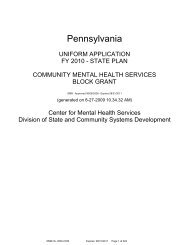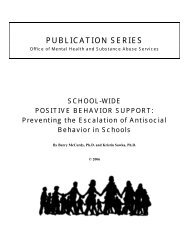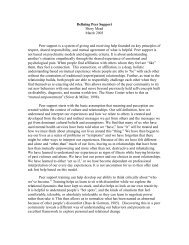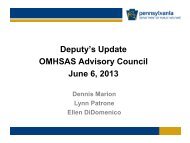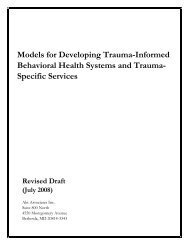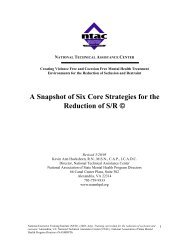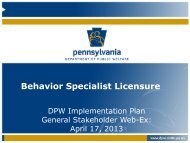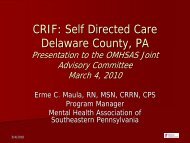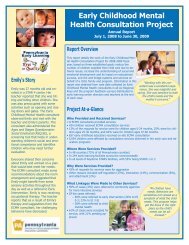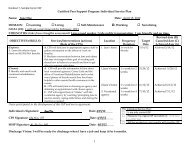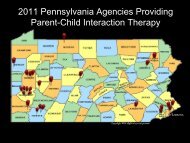Pa cassp - Pennsylvania Recovery and Resiliency
Pa cassp - Pennsylvania Recovery and Resiliency
Pa cassp - Pennsylvania Recovery and Resiliency
You also want an ePaper? Increase the reach of your titles
YUMPU automatically turns print PDFs into web optimized ePapers that Google loves.
PA CASSP<br />
State <strong>and</strong> Local <strong>Pa</strong>rtnerships<br />
For more than 20 years, the children’s behavioral<br />
health system in <strong>Pennsylvania</strong> has been guided<br />
by the CASSP philosophy. The acronym CASSP<br />
refers to the Child <strong>and</strong> Adolescent Service System<br />
Program, a comprehensive system of care for children<br />
<strong>and</strong> adolescents with serious emotional disorders<br />
<strong>and</strong> their families. The system of care<br />
approach, foundational to CASSP, ensures that<br />
services <strong>and</strong> treatment for children <strong>and</strong> adolescents<br />
with or at risk of serious emotional disorders are<br />
planned collaboratively with the family <strong>and</strong> all<br />
agencies involved in the child’s or adolescent’s life.<br />
<strong>Pa</strong>rtnerships are critical to the success of any system<br />
of care.<br />
A comprehensive <strong>and</strong> effective system of care<br />
recognizes that children <strong>and</strong> adolescents with serious<br />
emotional <strong>and</strong> behavioral needs often require<br />
services from more than one child-serving system.<br />
For example, a child with a behavioral health need<br />
is usually in school, <strong>and</strong> may also be receiving services<br />
from the child welfare, juvenile justice, or<br />
health care system due to emotional, social or<br />
physical needs, in addition to being part of a family.<br />
Planning takes into account the strengths of the<br />
child <strong>and</strong> family <strong>and</strong> these multiple needs, <strong>and</strong> involves<br />
different agencies.<br />
At the state level, departments <strong>and</strong> agencies<br />
with programs serving children collaborate on children’s<br />
issues. These include program offices in the<br />
Department of Public Welfare (Office of Child Development<br />
<strong>and</strong> Early Learning; Office of Children,<br />
Cross-Systems Initiatives<br />
• Alternatives to Coercive Techniques (restraint-free initiative)<br />
• Early Childhood Mental Health Consultation<br />
• Fetal Alcohol Spectrum Disorder Task Force<br />
• Integrated Children’s Services Planning<br />
• Juvenile Firesetter Intervention<br />
• Behavioral Health Needs of Children <strong>and</strong> Adolescents in<br />
the Juvenile Justice System<br />
Youth <strong>and</strong> Families; Office of Development Programs;<br />
<strong>and</strong> Office of Mental Health <strong>and</strong> Substance<br />
Abuse Services), the Juvenile Court Judges’ Commission,<br />
the Office of Health Promotion <strong>and</strong> Disease<br />
Prevention in the Department of Health (maternal<br />
<strong>and</strong> child health, drug <strong>and</strong> alcohol programs), the<br />
Office of Elementary <strong>and</strong> Secondary Education in<br />
the Department of Education, <strong>and</strong> the Bureau of<br />
Vocational Rehabilitation in the Department of<br />
Labor <strong>and</strong> Industry. (See below for a partial list of<br />
cross-systems initiatives.) The Children’s Subcommittee<br />
of the OMHSAS Advisory Committee brings<br />
together family members, advocates <strong>and</strong> professionals<br />
from behavioral health <strong>and</strong> the other childserving<br />
systems to provide input into state policy<br />
<strong>and</strong> program development. A Youth Advisory Subcommittee,<br />
consisting of youth who have been<br />
served by the behavioral health system, also provides<br />
regular input.<br />
At the county level, integrated children’s services<br />
planning is required by the Department of Public<br />
Welfare. Each county or joinder has at least one<br />
person identified as a CASSP or children’s behavioral<br />
health coordinator who serves as the county<br />
contact person for children with multi-system<br />
needs; these coordinators are resourced in part by<br />
their regional children’s teams consisting of designated<br />
individuals in the OMHSAS Field Offices<br />
(Pittsburgh, Harrisburg, Scranton <strong>and</strong> Norristown).<br />
Many counties also have local CASSP or children’s<br />
advisory committees.<br />
• Services for Deaf <strong>and</strong> Hard-of-Hearing Children with<br />
Behavioral Health Needs<br />
• School-Based Behavioral Health<br />
• St<strong>and</strong>ards for <strong>and</strong> Alternatives to Residential Treatment<br />
Facilities<br />
• Student Assistance Program<br />
• System of Care Initiative<br />
• Transition Planning <strong>and</strong> Services<br />
• Youth Suicide Prevention



